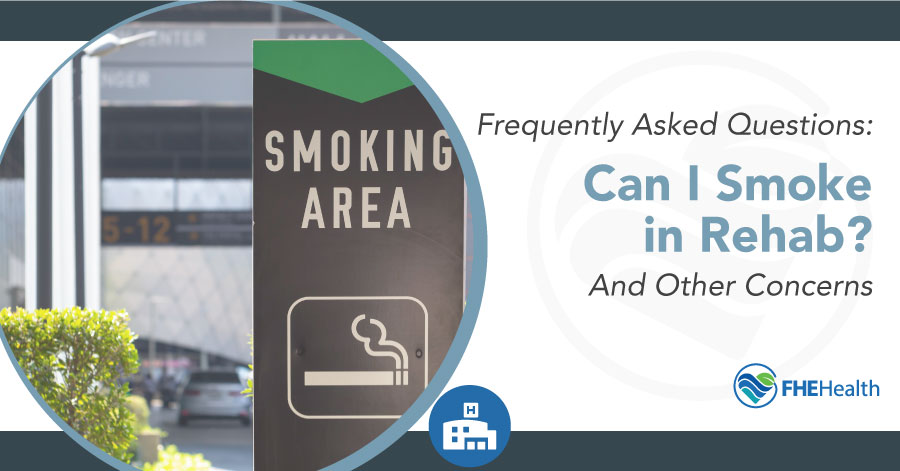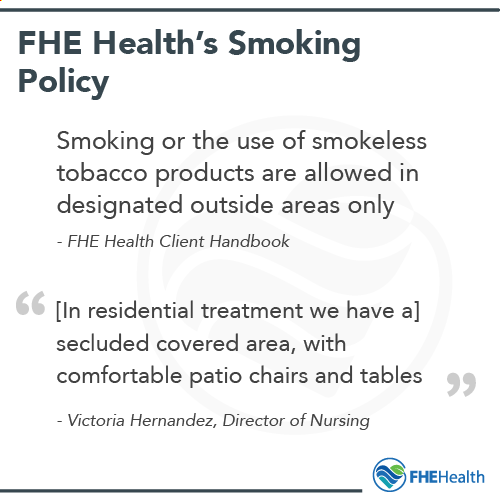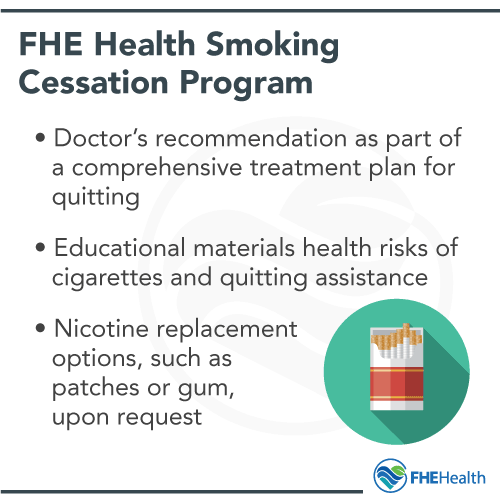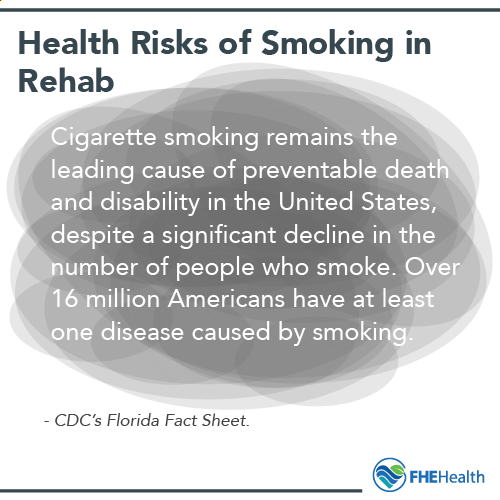
“Can I smoke cigarettes in rehab?” It’s a question many people ask when considering inpatient drug or alcohol treatment for the first time. The answer is a qualified “yes”: Quality behavioral health providers like FHE Health honor patients’ freedom and preferences to smoke in rehab; at the same time, patients can avail themselves of free supports to help them make healthier lifestyle choices, via an optional “smoking cessation program.”
In the next sections, you’ll learn more about our smoking cessation program, which is available to all interested patients. You’ll also learn why you are allowed to smoke in rehab—and why many people in rehab smoke—including the health risks and problems that cigarettes can pose in rehab, according to FHE Health Director of Nursing Victoria Hernandez. We’ll conclude with a brief look at the question of smoking marijuana in rehab.
Can You Smoke in Rehab?
 Yes, as we mentioned above. But what does “permission to smoke while in rehab” really look like? In the case of FHE Health, we offer designated smoking areas where patients are allowed to smoke at specific times so as not to interfere with the clinical services of the day.
Yes, as we mentioned above. But what does “permission to smoke while in rehab” really look like? In the case of FHE Health, we offer designated smoking areas where patients are allowed to smoke at specific times so as not to interfere with the clinical services of the day.
Hernandez said patients who want to smoke have access to an outside lounge that she described as a “secluded, covered area … with comfortable patio chairs and tables.”
Things to Consider
It is important to mention, though, that FHE Health’s providers, upon evaluation of the patient: discourage smoking and educate the patient that nicotine addiction is no different than other substance use disorders; and, explain to the patient that continued use of cigarettes can make it more difficult to recover from their drug(s) of choice. This is because nicotine triggers a neurochemical response in the brain similar to other addictive drugs.
Successful recovery from substances of abuse demands reconfiguring the brain’s neural pathways entirely, via neuro therapies that target areas of dysfunction and help to reduce and clear the brain’s addictive responses. Continued neurochemical addiction to nicotine can slow and hamper the effectiveness of these neuro treatments, which we use at FHE Health to speed and solidify patients’ recovery. The brain needs to heal in all areas for the best results, and a cessation of smoking and other addictive substances can aid in this recovery.
Moreover, smoking is often a part of the routine of doing other drugs. It’s thus not uncommon for smoking to trigger a craving for another drug—yet another reason not to smoke during rehab and early recovery.
Understanding all of this, prospective patients may be able to appreciate how smoking in rehab becomes a trade-off. On one end, health providers know and are aware of the various ways smoking reinforces drug use and inhibits recovery. On the other, to take away smoking in the early stages of recovery may prevent a patient from completing their full treatment course.
Because smoking is so addictive, removing it in the early stages of treatment provides one more challenge the patient must overcome in a very uncomfortable and challenging period of their life. Providers do not want the difficulty of quitting cigarettes to be the reason why a patient does not overcome their other life-threatening substance use disorders. For this reason, the smoking cessation program is voluntary.
Free Rehab Supports for Those Who Want to Quit Smoking
 Treatment is most effective when it is the individual’s own decision and not forced by others. It is the responsibility of FHE Health’s providers to provide the patient with the necessary education and allow the patient to make their own decision. The ability for a patient to make that decision on their own accord could itself be the difference in how well they respond to treatment.
Treatment is most effective when it is the individual’s own decision and not forced by others. It is the responsibility of FHE Health’s providers to provide the patient with the necessary education and allow the patient to make their own decision. The ability for a patient to make that decision on their own accord could itself be the difference in how well they respond to treatment.
Hernandez was quick to point out that patients also have the opportunity to make use of a free smoking cessation program. That program includes the following components:
- A doctor’s recommendation to quit smoking as part of a comprehensive treatment plan for one or more substance addictions
- Handouts offering education on the health risks of cigarettes and assistance for quitting
- Nicotine replacement options, such as patches or gum, upon request
As for the question, “Can you smoke marijuana in rehab?”—FHE Health, like all certified treatment centers, does not incorporate medical marijuana use into our treatment plans. Our patients therefore can’t smoke marijuana while attending our program. (For more info in related to questions about smoking marijuana in rehab, read on.)
Why Let Addicts Smoke in Rehab?
We of course understand this concern. Smoking isn’t good for anyone’s health and can be a serious addiction, after all. But when a person is addicted to heroin, cocaine or prescription opioids, treating these more serious addictions is the first priority. Similarly, when an alcoholic is considering detox—a potentially life-threatening process that requires medical supervision in an inpatient environment—our primary focus is giving them a real chance at sobriety and recovery. We would not want worries about having to quit cigarettes keep someone away from treatment for an addiction that is imminently more life-threatening and requires a safe, medically supervised detox.
The Link between Addiction Treatment & Smoking
Admittedly, there is a stereotypical association between rehab and cigarettes, and for good reason. Many patients—“a majority,” Hernandez estimated—smoke cigarettes to cope while they move through withdrawal and the early stages of recovery.
Hernandez said in many cases patients who come to rehab are not ready to give up smoking cigarettes. As a non-smoker, she said she was only able to speculate about the reasons many patients prefer to keep smoking while in rehab, but she suspected that many patients fall back on cigarettes as a way to cope in the absence of “other toxic” coping mechanisms such as drugs and/or alcohol. However, Hernandez also pointed out that continued smoking can undo the positive brain changes to curb addictive responses that neuro therapies elicit.
Health Risks of Smoking in Rehab
 The fact that, by Hernandez’ estimate, a majority of people in rehab are smokers should not eclipse the serious health risks and dangers of smoking. Hernandez quoted from the CDC’s Florida fact sheet on tobacco, which puts in stark terms just how damaging to one’s health nicotine addiction can be: “Cigarette smoking remains the leading cause of preventable death and disability in the United States, despite a significant decline in the number of people who smoke. Over 16 million Americans have at least one disease caused by smoking.”
The fact that, by Hernandez’ estimate, a majority of people in rehab are smokers should not eclipse the serious health risks and dangers of smoking. Hernandez quoted from the CDC’s Florida fact sheet on tobacco, which puts in stark terms just how damaging to one’s health nicotine addiction can be: “Cigarette smoking remains the leading cause of preventable death and disability in the United States, despite a significant decline in the number of people who smoke. Over 16 million Americans have at least one disease caused by smoking.”
In other words, no one is denying that smoking is an unhealthy habit. Cigarettes may be legal, but so is alcohol, which is also highly addictive. And, while cigarettes don’t carry the same potentially life-threatening risks of withdrawal that alcohol entails, a full assessment of nicotine’s harmful effects should alarm any smoker. The same 2015 study described nicotine as “one of the most toxic of all poisons.”
The Pros and Cons of Smoking in Rehab
From her experience working with patients who use cigarettes to cope in early recovery, Hernandez said, “I cannot report any positive effects of smoking at any point based solely on a medical perspective.”
But, Hernandez “has personally witnessed” multiple downsides of smoking in treatment, starting with “the continued attachment to a toxic or enabling relationship.” She has seen firsthand how patients exhibit some of the same addictive behaviors they’re trying to kick, when “asking for money for cigarettes” and “using smoking as an excuse to avoid groups or therapy sessions.” The same dynamic (a continued attachment to a toxic or enabling relationship) may help to explain why some patients take up smoking in rehab.
Another issue that can occur when someone is committed to falling back on cigarettes as a coping tool in rehab: what Hernandez described as “negative contracting.” That’s when a smoker uses their expressed need for cigarettes to stonewall the treatment process, along the lines of “I’m not doing anything until I smoke,” according to Hernandez.
Negative contracting can pose an obstacle to progress in treatment not only for the person doing it but for their peers, by setting a tone to not follow program rules or the timing of smoke breaks. Hernandez has even seen how it can “incite someone to throw a tantrum.” When a person is in this space, it’s often because of a “feeling of losing control of the only thing they feel they are in control of.”
Smoking Marijuana in Rehab
Accredited, quality treatment centers that accept health insurance are not allowed to use marijuana to treat substance addictions. (In states like California and Colorado, there may be some private-rehab outliers that use marijuana in treating drug and alcohol use disorders or allow patients to smoke marijuana recreationally, but these providers would be cash-pay only.)
Accredited rehab centers like FHE Health do treat marijuana addiction, however. Often people use marijuana to self-medicate an underlying mental health condition such as anxiety or depression. These are very treatable mental health conditions that are also covered by insurance.
If pot is secondary to another substance addiction, don’t let concerns about not being able to smoke marijuana in rehab keep you from pursuing the next critical step to freedom from addiction and better health. Consider these tips to quit smoking weed. Or, better yet, for personalized answers to your questions and concerns, give us a call today. One of our dedicated counselors would be happy to assist you.






